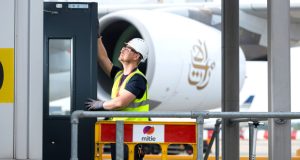AI AND THE USE OF DATA
Porter also believes that as technology advances, it’s going to have greater importance in discussions and especially as a way of measuring performance. ISS has invested heavily in technology with the establishment of a technology hub in Warsaw and a dedicated software development centre in Porto, Portugal.
For Porter: “Technical innovation for me means focussing on how do we best utilise client’s capital spend on their assets? How do we improve their maintenance schedules and how does that potentially feed in with sustainability goals as well as improve efficiency?”
For more employee facing services AI and data also plays a growing role for example the use of sensors in washrooms and key building areas to enhance cleaning schedules and establish the optimal labour model ultimately saving the client money.
He also cites the use of employee apps such as Convenie by ISS – a workplace app that is designed to improve the quality of work life and encourage positive behavioural change.
“Convenie can be critical to the workplace journey and occupant experience, helping employees navigate their office space and has numerous features like booking desks and meeting rooms, parking spaces, finding key information about their site etc.”, he says. “It also for example allows FMs to set up links to the food service side, whether to external providers or to your own kitchen menu as well.
“Technology also has a growing importance for remote working, both from a performance side, but clearly a safety side as well. When we talk to
global clients, they often have numerous remote sites, including small sites where you may only have an engineer or a cleaner going to deliver a service sporadically. Technology can support both our operational delivery and the safety of our placemakers.”
MANAGEMENT IN A GLOBAL SETTING
Porter manages a core team, with a global bid manager, a pricing lead and a creative lead for each opportunity and they could be based in the UK or just as likely be based anywhere around the world.
Says Porter: “Once you add in various country commercial and operational teams as well as Global SMEs, you end up leading a large diverse team. In my opinion it’s an art form, to be honest, managing a team well in the modern age where we no longer all sit in the same office; what I have found works well in managing global, diverse teams is having regular meetings that are also recorded, allowing key messages to reach further. Regular meeting cadence allows me to keep the key messages and momentum during a deal process moving, whilst giving all our teams a forum they can raise any concerns or questions they have in a psychologically safe space. Winning hearts and minds in my teams helps bring the best of ISS to any proposal.”
One of the most intriguing aspects of offering multi-national IFM services contracts is in managing the commencement of services, when the contract is agreed and commercial hand over to transition and operations. According to Porter, his team stay involved in handover sessions and some of the governance aspects.
He explains: “My role will go from the solution lead to a support role over the first few months. That is how ISS’ account development plans work in practice as we aim to get that continuity and make sure we start off where we want to go with the client. And where I see it work best is where we get the client to buy into joint training and joint workshops in that early stage, translating what we have agreed together centrally to our site-based teams as one voice.
“For example, with one Global office space client, 11 countries are involved. We jointly held 22 workshops across the global team over two months. The purpose was about understanding any resistance, the challenges, working them through together and ensuring our local teams aligned. This was a big change for our client’s country teams and it was important we supported the change process together.
“Ultimately the idea is to focus on the concept, on the solution and on the client, so they see the value of working with ISS and wanting to work with us. You often also must help them [the client] get their business cases through, whether that involves final approval meetings or country challenges which need to be addressed.
“Their problems are our problems, so we take them on together, and we try and solve them together.”





